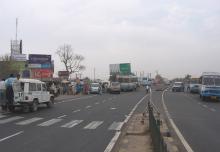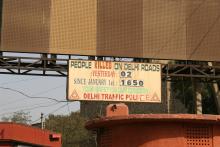
This area is also the location for a port operated by Adani, and this port is one of the most important ports in India for the handling of containers. The area also supplies almost 80% of the total demand for gas in India. This small area is one of the most valuable pieces of industrial real estate in India.
Unfortunately, however, the roads leading in and out of this area also witness numerous crashes involving trucks coming in and out of the port. These crashes lead to an unacceptably large number of fatalities every year. In a bid to tackle the problem, Shell India and IRF have teamed up to address the road safety situation in and around the Hazira Port Area.
To implement this project, IRF will address a number of key targets. Firstly, it will establish a road safety coalition for the Hazira Port Area. Secondly, it will conduct defensive driving course for drivers coming to the Hazira Port Area. Thirdly, the IRF will also carry out a safety awareness campaign in schools located in and around this area. And fourthly, the IRF will identify and recommend solutions for black spots.
One of the problems in improving safety in the Hazira Port Area is that no one single organisation or institution is responsible for maintaining the safety of road users in the area. The responsibilities are unclear and fragmented. As a first step, a Road Safety Coalition will be established, involving businesses located in the area, to address the issue of road safety in a holistic and comprehensive manner in the Hazira Port Area.
The IRF’s objective is to train around 4,000 truck drivers in defensive driving in the initial phase of this project. This training will be conducted in the local language and is aimed at making drivers aware of the risks they personally undertake by driving recklessly. It will also help in imparting basic skills to enable them to drive more defensively, for example, recognising dangerous situations before they occur, matching driving behaviour to the actual weather conditions, and the importance of periodically stopping and resting.
The safety awareness campaign will be carried out in 30 local schools. The prime objective of this campaign is to make students and school staff aware about responsible and safe road use behaviour, and to put in place safety management programs around schools.
Finally, an audit of the road infrastructure will be carried out to identify black spots. Recommendations will be made to remove these black spots once they have been identified.













